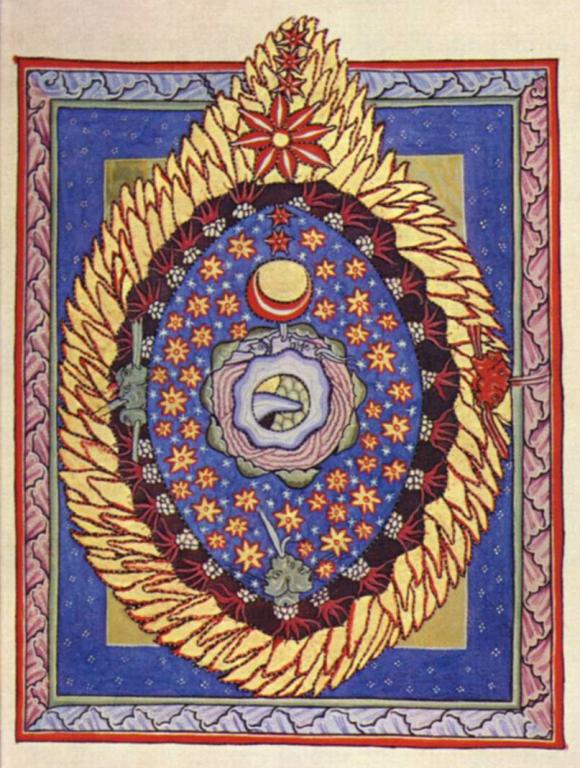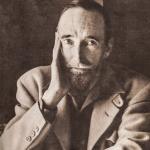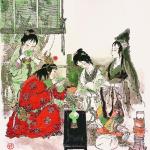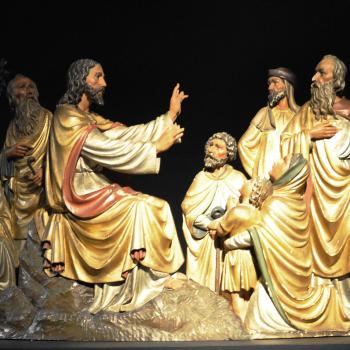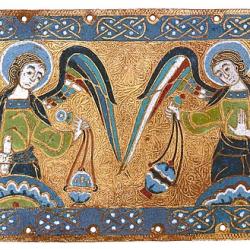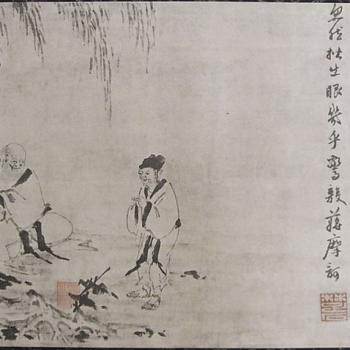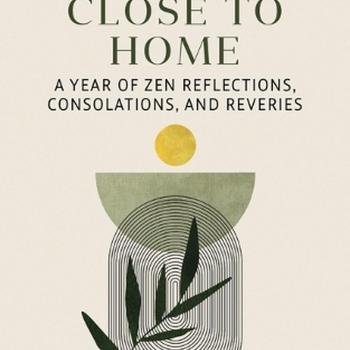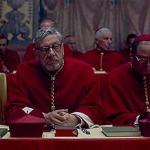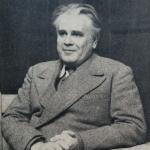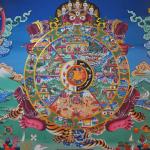I saw a huge form, rounded and shadowy, and shaped like an egg… Its outer layer consisted of an atmosphere of bright fire with a kind of dark membrane beneath it… From the outer atmosphere of fire, a wind blew storms. And from the dark membrane beneath, another membrane raged with further storms which moved out in all directions of the globe.
Hildegard of Bingen, Scivias, Book One, Vision Three
It’s been such an honor, and a genuine pleasure to serve as one of your consulting ministers here at the First Unitarian Church of Los Angeles for these past three years. And, well, everything ends. As the wise remind us, change is the only constant.
For Jan and me, for all practical purposes we’ve moved to Tujunga to be with Jan’s mom. For now, it’s pretty light lifting. But we do need to be around. In reframing our lives for this next bit, I see a broad outline.
Family first.
But also, I’ll continue to write. I now have contracts for two books, what will be my sixth and my seventh. Maybe there’ll be more after these, but I wouldn’t bet a great deal of money on it. The first has been a deal in the works for a while now. It’s a reflection on the arc of the spiritual life which is due from Shambhala Publications in July of 2024. The second, a reflection on the core of Zen teachings against the backdrop of the chaos of religion in the Global North, will be published by Monkfish in the Fall of 2025. Of course, my Monkey Mind blog continues. As of this month I’m beginning my seventeenth year with it. And while nowadays it’s a couple of times a week rather than near daily, I very much continue to enjoy it.
Our online Zen community continues. If you are looking for a meditation group, check us out. Just google Empty Moon Zen, or my name and Zen. As to Unitarian Universalism, the closest congregations to us in our new lives are the two in Pasadena. Next week, I’ve been asked to cover the Sunday services for the minister at Neighborhood Unitarian Church, who has an unexpected obligation. I’m open to being of use. I like being of use. But any future obligations will be light.
I’m feeling my seventy-five years. And this feels enough.
All that said, what about today? What can I say beyond letting you know what my near future plans are, and my expressions of love and gratitude. I am so impressed with this vibrant little band gathered and thriving in the crumbling edifice of an historic church at the heart of one of the great global cities.
I love what I see. And basically, what I see is a manifestation of the spiritual but not religious. Or, in your case, perhaps the spiritual but barely religious. Kind of the hallmark of our contemporary Unitarian Universalism at our best.
I see in your band lots of concern for the world. Care and social engagement beating a strong heart that motivates a lot of what you are about. Although maybe as a group a bit less clear about what that spiritual part might be. This is the First Unitarian Church, after all. And maybe something to attend to. It, some spiritual intuition, is, I suggest, what informs your reaching out to the world. Or can. And understanding it can sustain you for the long haul.
So, this intuition is what I feel is important to talk about today.
As it happens today is celebrated within the Christian world as the feast of Hildegard of Bingen. She was born at the tail end of the eleventh century into the “lower nobility” of the Holy Roman Empire, which you may recall from some history class was not holy, nor Roman, nor an Empire. Rather it was a confederation spanning much of central Europe for quite a while. Hildegard lived in what today is Germany.
She spent her life as a Benedictine nun. She was also a visionary. Which truthfully barely describes the abbess, one of the singular people not only of her age, but right down to today. Her interests and the subjects of her visions were wide, ranging from medicine, to music, to the natural sciences, especially ecology. Hildegard wrote what is generally considered the oldest surviving morality play. Throughout her life she continued to break past the conventions of gender and became a popular preacher, taking three major tours to lecture on her teachings. She became counselor to bishops and kings. She even had the pope’s ear.
Speaking of teachings, through extensive commentaries on her visions Hildegard became a major theologian. I’ll return to her and that in a moment.
A major question for our time and place where the supernatural aspects of religions are increasingly hard to support. Where God has been reduced to the cracks of science, and any idea of human beings standing in any way outside the flow of natural events seeming absurd on the face of it, well, what does this mean for any kind of spirituality? Especially considering that intuition of care and our sense of some call to justice? What about meaning? What about purpose? What can these words mean for us today?
We live in a secular world. That is a nonreligious world. This is a hallmark of our times and extends well beyond the Global North. And one thing for sure, our secular age isn’t big on meaning and purpose. Spiritual practices are reduced to physical and mental hygiene. And somehow the secular has slid rapidly into a bare consumerism.
There’s a lot of analysis of neo-liberalism. When you look at it, some of it is actually coopted by market assumptions. Lots of ironies in our lives. But this ubiquity of markets also points to the sea in which we now live. We are customers and product. And in service to that our lives are distracted from any considerations beyond the market. I’m taken by the Christian term for this distracted world: Empire. It fits. The empire’s tendrils of grasping and endlessly arising fixes to that which ills that are all available for the right price. And, rage at those who dare say otherwise.
Empire also reminds us that this consumer age is simply the most current iteration of something poisonous in our human hearts. And. This is the world we live in. One would be foolish not to understand economics and business at some nitty gritty levels. It is where we live. And pretending otherwise is probably a mistake. But even if this is the world, there is also something profoundly wrong in a consumer driven life. Living in the empire is not a good thing.
It often seems to be a path to despair. I looked and it seems about one in twenty among us are regularly using prescription medications for anxiety. And, for most of us who are, I think its important people have that help. A lot more of us are self-medicating in all sorts of different ways. Again, I’m not really against that. These are practical responses to something deeply wrong.
Yes, with a lot of “buts” and “ands.” But. And. And a turning, or at least an invitation.
What is our spirituality? What might be a current that runs through all our different approaches within this community?
I suggest a great deal of this project turns on engaging nonduality. The term means not dual. It is a view of the world that encompasses two truths that appear on the surface of things to be mutually contradictory. We are as we are in this world you and I and all the other things. Discrete, individual. Rising and falling. Subject to the currents and tides of events.
And. In our Unitarian Universalist sense each of us precious. I suggest because at the very same time of all this rising and falling, the nondual assertion is that we are all bound up together. In some very, very real sense is the assertion we are one. It’s actually within that intuition we can speak of precious, valuable, unique and wondrous.
I suggest to you out of my years, that the spiritual project is about understanding this nonduality as our intimate personal truth. We find it, and we understand ourselves. We find it and we understand our impulse to be of use in this world. This sense realized is a cornucopia of care and love, and, through those things, justice.
It’s good to notice most of religion is about culture. Framed generously religion is about cultural cohesion. Framed more harshly, it’s about crowd control. Religions is mainly about serving the Empire. But is there more to this? Especially as we take the teachings of religions as hard-earned metaphors for deep matters. The literal often is for the Empire. The images and metaphors held not as history but as the currents of our inner lives belong to the nondual.
As I see it most all religions have this nondual aspect. For some it is very much in the background, and on occasion bald assertions of nonduality is suppressed and even violently persecuted. After all, nonduality challenges all sorts of cultural norms, is anathema to the Empire. That said in some religions the nondual gets a more central place. Zen Buddhism is an example. Especially as Zen offers some practical spiritual disciplines to help people find this nondual truth as a personal thing. Although there is a warning in how in Japan the Zen churches were successfully coopted by Empire, in this case the literal one, leading into the second world war. We always have to be careful when engaging the deeper matters of our spiritual lives.
But the important thing I want to share here is that nondual impulse, and its practices. That it exists many places, each with different twists, is also important. To cite two examples. Zen’s nonduality is also nontheistic. Advita Vedanta the nondual in Hinduism is theistic. My take away is how we humans encounter this great nondual mystery in all sorts of ways. I would add our Unitarian Universalist stream of nonduality arises within Transcendentalism, which itself is ultimately nature-centered, and Universalism, the intuition that no one is left behind.
Which brings us, at least briefly, back to the wondrous Hildegard of Bingin. One writer, Marco Vannini, tells us how “Hildegard found the meaning of the unity and divinity of the cosmos with which the human being is profoundly and wonderfully united, to the point of constituting itself a cosmos, and a whole.” There is something potentially powerful for us here as we consider the whole of which we are a part, and in that find an invitation to discover how we, you and I, as we are, recapitulate the whole of the cosmos. As we are. As who we are. Secrets of the nondual.
For Hildegard we humans are each of us the manifestation of the divine. It wasn’t hierarchical as so much of Christianity is, but rather, in her imagery, like a cosmic egg, where all the nested layers are interconnected. And, I find critical for our time and place, centered in the earth. Hers was a mystical ecology, where everyone, and in a very real sense everything is connected, and holy.
There’s a lot in what she says that is directly applicable to a contemporary nature-centered Unitarian Universalism.
Kind of a bottom line: As UUs we are invited to see for ourselves. We start with the individual. But be careful. The seductions of markets, the seductions of consumerisms of all sorts arise from an unbalanced sense of the individual. The Empire rests selling the belief that what makes me feel good for a moment is the measure of all things. And that everything is disposable.
The good in this is that we get to choose. But what we choose matters. Instead of cheap goods and quick fixes, what about the possibilities of looking to the ancestors and guided by them, into the depths of our own hearts? What happens when we allow the mystery to unfold as our living truth?
What I find most important for us, for you, if you hope to find peace for yourselves, and to be active participants in the healing of the many wounds, you need to know for yourself, in your own way, what this nondual is.
It cannot be found in a denial of our individuality. The individual, you, me, we need to see how much we are bound up together. For us, while there are wonderful spiritual disciplines, like meditation, and I commend them, but for UUs specifically the main way we find this by engaging communally.
I suggest we need to reframe what that looks like. This is our sacred work. And maybe yours? We need to move away from the bare inheritance of our Puritan ancestors, or from a knee-jerk reaction by rejecting their myths because they don’t map history. The stories of the ancestors do map our hearts, if always in part, and properly engaged, can be enormously helpful.
Here, I think of Mordecai Kaplan the founder of Jewish Reconstruction. In my years as a UU parish minister, two of the four churches I served housed Reconstructionist congregations. I loved them. On the one hand they were enthusiastic, whole-hearted observers of the tradition. When I think of theologians I tend to think of logicians, theoretical, and frankly, often bloodless. Reconstruction shows something different.
Their services ran on, sometimes for hours, filled with singing and procession and dancing. To the casual observer they looked remarkably like Orthodox or Hasids. But. Women counted for minyan. And I knew for a fact many were agnostics or atheists. Originally Orthodox, Rabbi Kaplan’s approach to the tradition was pragmatic. As he would say of the traditions, they have a vote, but not a veto.
Another line for this is engaging one’s religious tradition seriously but not literally.
Here I see a possible pattern for you all. For Unitarian Universalist’s writ large. But specifically for this congregation in Korea Town.
I think about why it makes sense to embrace the holy rather than simply slipping into secularism. And with that, what might it look like? Where is the orthopraxy of natural religion? I suggest an embrace, specifically, of Transcendentalism and Universalism. In its several strands, the Hindu-like Transcendentalism of Ralph Waldo Emerson, the Taoist-like Transcendentalism of Henry Thoreau, and the feminist Transcendentalism of Margaret Fuller. There are Buddhist Transcendentalist strands. There are Christian Transcendentalist strands.
And equally important discovering the intimations of the nondual that run a rich current through our Universalist history. Our Unitarian strand is rich with stories of standing up to authority. Our Universalist strand is awash with miracle and intimations of joy.
Taken together the invitation for us here today is a New Universalism.
We’ve inherited something rich. Pay a little attention to it.
Here we find endless possibilities.
And this, dear ones, is my last word. I hope it’s useful.
Amen.


